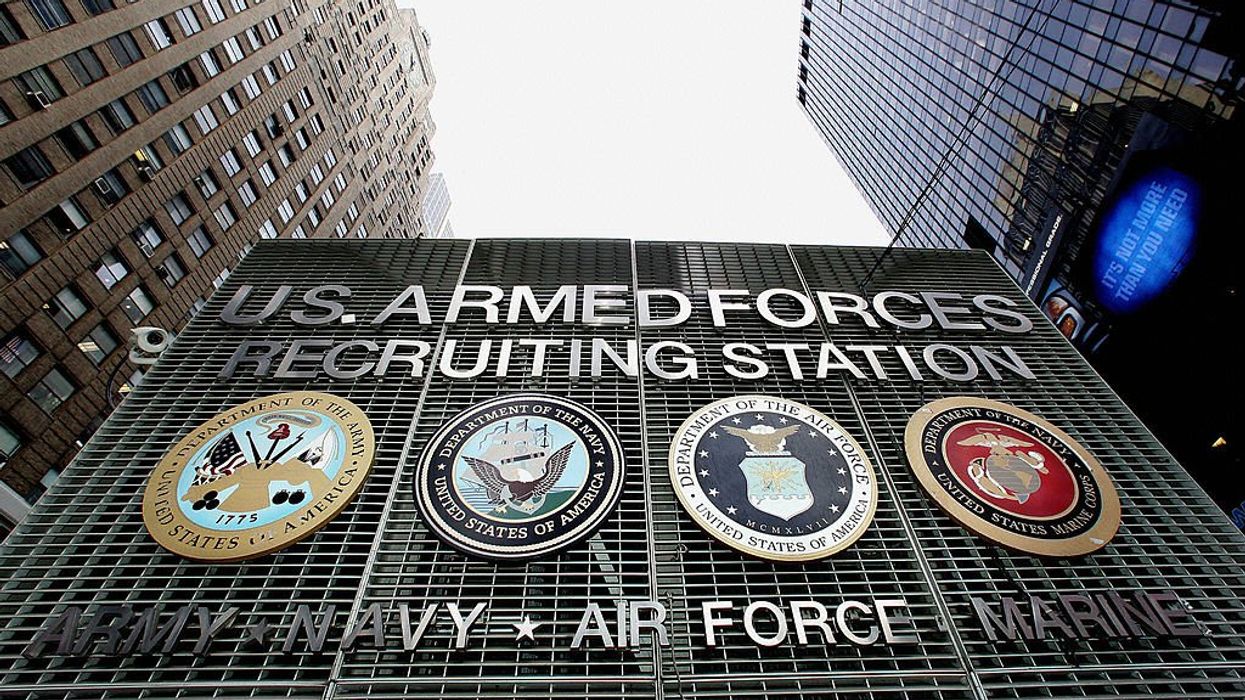
DON EMMERT/AFP via Getty Images

The Pentagon's concerns about military readiness, further infection, and cost evidently fell on deaf ears.
A Clinton-appointed federal judge has ruled that the U.S. military cannot bar HIV-positive individuals from enlisting if they've temporarily rendered their viral loads undetectable through the use of costly antiretroviral drugs, which usually require daily use.
Judge Leonie Brikema of the U.S. District Court for the Eastern District of Virginia previously handled two consequential cases in which she ruled against certain military service restrictions on HIV-compromised individuals — persons who if left unmedicated could possibly succumb to opportunistic infections and/or infect their comrades.
Citing her own opinions in those cases, Brikema asserted in her Aug. 20 ruling that the Pentagon's "policies prohibiting the accession of asymptomatic HIV-positive individuals with undetectable viral loads into the military are irrational, arbitrary, and capricious."
"Even worse, they contribute to the ongoing stigma surrounding HIV-positive individuals while actively hampering the military's own recruitment goals," continued Brikema.
'HIV is an infectious, incurable, bloodborne disease with several possible ways in which the disease could be transmitted to other service members.'
The lawsuit that precipitated Brikema's ruling was brought on behalf of three HIV-positive individuals and a leftist advocacy group.
The first, Isaiah Wilkins, is an HIV-positive 24-year-old homosexual who receives HIV-related health care from the VA Medical Center in Atlanta, Georgia. He has to take pills to suppress his viral load. Wilkins seeks to enlist in the Army.
According to a 2023 Congressional Research report, the Pentagon's Armed Forces Health Surveillance Division estimated that between January 2017 and June 2022, 1,581 service members were newly diagnosed with HIV.
The second plaintiff is Carol Coe, a 33-year-old transvestite living in Washington, D.C. He contracted HIV while serving in the military, then left the military in 2013 to get a sex change. Coe attempted to re-enlist in 2022 but was unsuccessful on account of his infectious disorder.
The third plaintiff is Natalie Noe, an Australian now living as a permanent resident in California. She was similarly told that her HIV positivity was a negative where recruiters were concerned. To manage her HIV, Noe takes pills daily and is injected with an antiretroviral therapeutic every three to six months.
The trio were joined in their action by Minority Veterans of America — a leftist advocacy group committed to "social and structural change" that has worked to guarantee access to "abortion and contraception, and gender confirmation surgery through VA for veterans."
'We are pleased the court has eliminated the last discriminatory policy that barred people living with HIV from seeking enlistment or appointment to the military.'
The suit was filed against the Department of Defense in November 2022.
According to the original complaint, medical advances in HIV treatments "should have led to an overhaul of military policies related to people living with HIV. Instead, the Department of Defense and the Army — and all military departments — have maintained the bar to enlistment and appointment of people living with HIV."
The suit claimed that policies barring HIV-positive prospects from enlisting violated the Fifth Amendment's Due Process Clause and the Administrative Procedure Act.
Court documents indicate that the Pentagon argued that:
the military's HIV policies are rationally related to promoting the health and readiness of the armed forces. For example, defendants continue to argue that asymptomatic HIV-positive individuals with undetectable viral loads may not take their daily medications properly, which would result in their viral loads rising; that HIV is an infectious, incurable, bloodborne disease with several possible ways in which the disease could be transmitted to other service members, such as through battlefield blood spatter or transfusions; and that HIV is associated with various comorbidities and side effects that could harm a service member's health.
The Pentagon further suggested that:
Brikema, evidently unpersuaded by these arguments, has enjoined the Pentagon from barring HIV-compromised individuals with undetectable viral loads from joining the military.
"We are pleased the court has eliminated the last discriminatory policy that barred people living with HIV from seeking enlistment or appointment to the military," stated Gregory Nevons, senior counsel for Lambda Legal, an outfit that helped file the case. "Americans living with HIV no longer face categorical barriers to service careers — discharge, bans on commissioning, bans on deployment and finally bans on enlisting."
"This is a victory not only for me but for other people living with HIV who want to serve," said plaintiff Isaiah Wilkins.
The Military Times indicated that the Pentagon declined to comment on the ruling.
While HIV-compromised candidates have been given the green light to enlist, the Pentagon still has prohibitions on the recruitment or retention of persons with certain maladies, such as Crohn's disease, kidney abnormalities, asthma, anemia, gout, rheumatoid arthritis, various sleep disorders, and excessive sweating.
Like Blaze News? Bypass the censors, sign up for our newsletters, and get stories like this direct to your inbox. Sign up here!